词形变换类题型的几个考点.
词形变化考查要点

词形变化考查要点部分动词后加“er”或“or”转化为表示动作实施者或指职业方面的名词。
一、加后缀-er的几种情况:1. 一般情况,后缀er teach—teacher(教师)read—reader(读者) work—worker speak—speaker clean—cleaner2.以-e结尾的动词,直接加-r:drive-driver(司机) ride-rider(骑马者) save-saver(救星) examine-examiner(主考人) manage-manager(经理)练习:race-receive-write-dive-3.由“辅音+元音+辅音”构成的单音节动词,-般要双写词尾的辅音后再加-er:cut-cutter(切割者) dig-digger(挖掘者) rob-robber(强盗) run-runner(赛跑选手) win-winner hitter (打)getter()putter()setter()sitter(坐者)swimmer()但beg(乞讨)的名词是beggar(乞丐)。
4.以-y结尾的动词,如果y前是元音字母,-般加后缀-er;如果y前是辅音字母应先将y变为i再加-er1)buy-buyer(买主) p1ay-player(运动员) destroy-destroyer(破坏者)2)carry -carrier(搬运工) dry-drier(干燥机)二、加后缀-or的几种情况1.以-ate结尾的动词应先去掉e再加-or;translate—translator operate(作手术)-operator(手术者) create(创造)-creator(创造者) elevate(举起)-elevator(电梯) separate(分离)-separator(分离者)2.以-ct结尾的动词-般加-or:act-actor(演员) collect-collector(收集者) invent-inventor 3.以-ess结尾的动词-般加-or:profess(教)-professor(教授) 但dress(使穿衣)的名词是dresser(穿衣者).4.以-it结尾的动词一般加-or:visit-visitor(访问者) edit<编辑)-editor(编者)三、动词转化为名词1. 部分动词后加“ing”可转化为名词。
高考词语知识点总结

高考词语知识点总结高中阶段是每个学生的关键时期,尤其是备战高考,词语的学习是基础之一。
为了帮助同学们更好地掌握高考相关的词语知识点,本文将对高考词语知识点进行总结。
一、词性转换词性转换是词语灵活运用的重要方面。
以“善良”为例,它既可以是形容词,也可以是名词。
在高考听力和阅读理解中,我们常常需要根据句子的需要将词性进行转换。
以下是一些常见的词性转换案例:1. 形容词-->名词:美丽(形容词)-->美丽(名词),幸福(形容词)-->幸福(名词)2. 名词-->形容词:中国(名词)-->中国的(形容词),孩子(名词)-->孩子们的(形容词)3. 动词-->形容词:激动(动词)-->激动的(形容词),感动(动词)-->感动的(形容词)二、词义辨析词义辨析是高考词汇题目的常见考点。
同学们需要通过上下文来判断词语的具体含义。
以下是一些常见的词义辨析案例:1. 善良和友善:善良一词强调个体的本性是善良的,而友善强调个体对他人友好和体贴。
2. 崇高和庄严:崇高一词描述的是人的思想、行为等具有极高的道德境界,庄严侧重于场合的庄重、肃穆。
3. 气质和性格:气质强调天生的,与生俱来的特定品质,性格指的是一个人长期形成的行为方式及其对外界环境的适应情况。
三、词语搭配词语搭配是高考考察的重要内容之一。
理解词语之间的搭配关系可以帮助我们准确、地道地使用词汇。
以下是一些常见的词语搭配案例:1. 白日梦:形容一个人白天做着空想、梦幻的事情,无法实现。
2. 手舞足蹈:形容非常高兴,兴奋到手舞足蹈的程度。
3. 春寒料峭:形容春天虽然已经到了,但仍然很冷。
四、词语辨析词语辨析是高考语法题中常见的考点之一。
以下是一些常见的词语辨析案例:1. 当代和现代:当代侧重指当前的;现代强调时代、发展阶段。
2. 适应和适合:适应强调主语主动调整自己以适应环境;适合强调客体与主体相适应。
3. 信任和相信:信任强调对人的信赖;相信侧重指对事物真实性的肯定。
八年级词形变化汇总
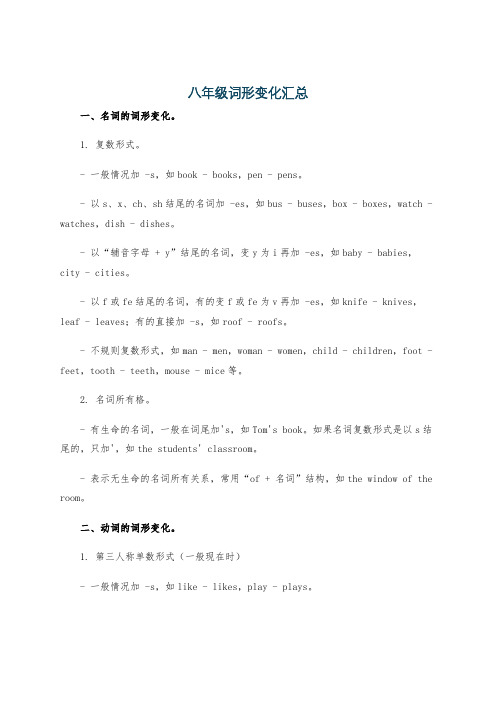
八年级词形变化汇总一、名词的词形变化。
1. 复数形式。
- 一般情况加 -s,如book - books,pen - pens。
- 以s、x、ch、sh结尾的名词加 -es,如bus - buses,box - boxes,watch - watches,dish - dishes。
- 以“辅音字母 + y”结尾的名词,变y为i再加 -es,如baby - babies,city - cities。
- 以f或fe结尾的名词,有的变f或fe为v再加 -es,如knife - knives,leaf - leaves;有的直接加 -s,如roof - roofs。
- 不规则复数形式,如man - men,woman - women,child - children,foot - feet,tooth - teeth,mouse - mice等。
2. 名词所有格。
- 有生命的名词,一般在词尾加's,如Tom's book。
如果名词复数形式是以s结尾的,只加',如the students' classroom。
- 表示无生命的名词所有关系,常用“of + 名词”结构,如the window of the room。
二、动词的词形变化。
1. 第三人称单数形式(一般现在时)- 一般情况加 -s,如like - likes,play - plays。
- 以s、x、ch、sh、o结尾的动词加 -es,如go - goes,do - does,watch - watches。
- 以“辅音字母 + y”结尾的动词,变y为i再加 -es,如study - studies。
2. 动词的 -ing形式(现在分词)- 一般情况加 -ing,如read - reading,write - writing。
- 以不发音的e结尾的动词,去e加 -ing,如make - making,take - taking。
【初中英语】词形变换答题技法

【初中英语】词形变换答题技法一、考题分析词形变换是各省市中的一个保留题型,它所涉及到的形式主要包括:名词的数与格;代词及其格(主格、宾格、所有格);数词的形式(基数词和序数词);动词(单数第三人称、过去式、过去分词和现在分词)及非谓语动词(动词不定式、动名词和分词);形容词,副词及其比较等级;反义词和同音异义词等。
词形变换题一般有三种出题形式:一种是按括号内的要求转换词形;一种是根据句意,用括号内所给词的适当形式填空;还有一种是括号内给出汉语,要求根据句子意思及所给汉语提示,写出空缺处各单词的正确形式。
第一种题型,即按括号内的要求变换词形比较简单,要做好它靠平时多积累,强化即可。
第二、三种题型较复杂,它涉及动词的时态、语态及各类词之间的相互转化等。
二、答题要做好该类题必须注意以下几点:1.背诵全句,弄清楚句意;2.弄清所给单词的词义、词性以及具体要求。
3.必须考虑到外来语所处的语境及其他词对它的管制;4.注意单词拼写务必正确。
三、空战演练i.用所给名词的正确形式填空。
1.the_______aregoingtofrancebyair.(smith)2.thesecoatsareforwomen.________coatsareoverthere.(man)3.—whereareyougoing?—i’mgoingtomy_______.(uncle)4.howmany______didyouseeonthehill?(boy)5.don’tmakeanynoise.the______aresleeping.(baby)6.______liketoplaythisgame.(child)7.heiswearingapairof_______.(glass)8.howmucharethe_______?(tomato)9.therearemany______inthebook.(photo)10.theradiosaysitwillbecloudyat______.(time)11.hesaidhehadbeentherethree_______.(time)12.alotof______arewatchingthefootballmatch.(people)13.two_____spokeatthemeetingyesterday.(japanese)14.therearesome______infrontofthehouse.(sheep)15.pleasehelpyourselftosome_______.(fish)16.therearemanydifferent______inthelake.(fish)17.hehascaughtten________.(fish)18.therearemany_______overthere.(factory)19.theshopisonehundred_______awayfromhere.(metre)20.bothtomandjimare______teachers.(man)参考答案1.smiths2.men’s3.uncle’s4.boys5.babies6.children7.glasses8.tomatoes9.photos10.times11.times12.people13.japanese14.sheep15.fish16.fishes17.fish(es)18.factories19.metres20.men。
词形变换类题型的几个考点.

词形变换类题型的几个考点一、可数名词单数变复数类: 1.规则变化 :(1) (2) (3) ( 4)(5)以 f 或 fe 结尾的名词变 f 或 fe 为 v 加-es 。
如:leaf f leaves, knife f knives, shelf f shelves wife f wives 等。
2.不规则变化的名词要熟记:man f men, woman f women,child f children,foot f feet,toothfteeth ,mouse f mice,people f people, sheep f sheep, Chinese f Chinese , Japanese f Japanese , deer f deer 二、 动词 / 名词变形容词类: 1. 在动词后加后缀 -ful, 如: care f careful;use f useful; thankfthankful; help f helpful;wonder f wonderful forget f forgetful 2.在名词后加 -y, 如:luck f lucky, cloud f cloudy; wind f windy; rain sunny, snow f snowy noise-noisy health f healthy3.在名词后加 -ly, 如:friend f friendly4.方位名词加 -ern ,如: east f eastern west 三、 形容词加后缀变成名词 1.形容词加 -ty 变成名词,safe f safety 2.形容词加 -th 变成名词,true f truth四、 形容词变副词类:形容词修饰名词、代词等作定语或表语;1.一般形容词词尾加 -ly 变成副词,如: slow f slowly clear f clearly careful f carefully sudden fsuddenly real safe f safely wide f widely 2 .以“辅音字母+y ”结尾的,要变y 为i 加-ly ,如:easy f easily , happy f happily , heavy f heavily , lucky f luckily , busy f busily angry f angrily; 3.以元音字母+ e 结尾,去e 加-ly ,如:一般情况加 -s, 如 : girls, books, pens, bags, boys, days 等。
高考英语词性转换知识点精编版

高考英语词性转换知识点精编版1.名词转动词名词转动词的方法一般有以下几种:1) 加-ing:常见的词性转换方式就是将名词加上-ing后即可转换为动词,表示正在进行的动作或状态。
例如:truth(名词,真理)→truth-ing(动词,查找真相)2) 加-ize或-ify:有些名词在转换为动词时需要添加-ize或-ify 后缀。
例如:apology(名词,道歉)→apologize(动词,道歉);beauty(名词,美丽)→beautify(动词,美化)3) 加-ize变化:有些名词转动词时直接加-ize后缀。
例如:organize(名词,组织)→organize(动词,组织)2.形容词转副词形容词转副词的方法一般有以下几种:1) 加-ly:常见的词性转换方式就是将形容词加上-ly后即可转换为副词。
例如:quick(形容词,快的)→quickly(副词,快速地)2) 不加后缀:有些形容词可以直接转换为副词,不需要添加后缀。
例如:fast(形容词,快的)→fast(副词,快速地)3.动词转名词动词转名词的方法一般有以下几种:1) 加-ing:常见的词性转换方式就是将动词加上-ing后即可转换为名词,表示该动作的状态或结果。
例如:paint(动词,绘画)→painting(名词,绘画)2) 加-er:有些动词转换为名词时需要添加-er后缀,表示该动词的展现者或从事者。
例如:teach(动词,教)→teacher(名词,教师)3) 加-ion或-ment:有些动词转换为名词时需要添加-ion或-ment后缀。
例如:inform(动词,通知)→information(名词,信息)4.形容词转名词形容词转名词的方法一般有以下几种:1) 加-ness:常见的词性转换方式就是将形容词加上-ness后即可转换为名词,表示该形容词的性质或状态。
例如:kind(形容词,友善的)→kindness(名词,友善)2) 不加后缀:有些形容词可以直接转换为名词,不需要添加后缀。
英语单词词性转换的基本规律

英语单词词性转换的基本规律一词性变换的一般的规律1.动词(v.)→名词(n.)(a)词形不变,词性改变work, study, water, plant等可以用作动词(工作,学习,浇水,种植),也可以用作名词(工作,学习,水,植物).(b)一些动词在词尾加上-er或-or之后就变成了表示"某一类人"的名词例如:work—worker, teach—teacher, sing—singer, jump—jumper, play—player, learn—learner, visit—visitor, invent—inventor,collect—collector等.注意:1)以不发音的e结尾的动词,在词尾加-r.例如:drive—driver, write—writer等.2)以重读闭音节结尾,且末尾只有一个辅音字母的动词,应双写末尾的辅音字母,再加-er例如:run—runner, win—winner,begin—beginner等.(c)在动词词尾加上-ment 变成名词例如:achieve—achievement (成就) advertise—advertisement(广告) agree—agreement disagree—disagreementamuse—amusement (娱乐) improve—improvement(争吵)commit(奉献)—commitment develop—development (发展)depart—department (局,部) govern(统治)—government(政府)manage—management (管理) equip—equipment (装备)有些单词比较特殊,需把动词后的e去掉再加ment.例如:argue—argument(争论)(d)在动词词尾加上-(t)ion/(s)ion变成名词例如: attract—attraction; instruct—instruction;invent—invention discuss—discussion;express—expression educate—education;graduate—graduation; operate—operation (去e再加"ion")compete—competition; organize—organization (把e改成其他字母再加"tion") decide—decision conclude—conclusion (把de改为s再加"ion")describe—description描写,描绘(这是特例,不规则变化)(e)在动词词尾加上-ance变成名词例如: appear—appearance (外貌;出现) perform—performance (演出)accept—acceptance (接受)(f)在动词词尾加-ing变成名词(方法与动词变为现在分词的方法相同)例如: meet—meeting build—building wait—waitingbathe—bathing say—saying(谚语) mean—meaningend —ending train —training wash—washing注意:以重读闭音节结尾,且末尾只有一个辅音字母的动词,应双写末尾的辅音字母,再加-ing如:swim—swimming shop—shopping begin—beginning(g)其他一些比较特殊的变化例如: Beg(乞讨)—beggar(乞丐) behave(行为举止)—behaviorknow(知道)—knowledge(知识) fly—flight (飞行)heat (加热)—heat(热量) hit (撞击)—hit( 轰动一时的人或物,碰撞)mix (混合)—mixture(混合物) press(按,压)—pressure(压力)sit(坐)—seat (座位) succeed—success(成功)tour—tour(旅游)/ tourist (游客)2.动词(v.)→形容词(adj.)(a)动词后面加able,以e结尾的动词则去e加able,表示具有此性质,特点或属性.例如: afford-affordable;love-lovable(b)动词后面加ed,以e结尾的动词则直接加d,表示被动性的属性或特点.例如: scatter-scattered use-used(c)不规则的动词则必须记忆,记住其过去分词形式.规律不大,意义同(b).3.名词(n.)→形容词(adj.)(a)在名词后面加-y可以变成形容词(尤其是一些与天气有关的名词)例如: rain—rainy, cloud—cloudy, wind—windy, snow—snowy,health—healthy, luck—lucky,anger—angry guilt—guilty(内疚的)tourist—touristy(游客多的) , salt (盐)—salty (咸的)silk(丝绸)—silky(丝绸般的), sleep—sleepy (昏昏欲睡的)注意:1)如果以重读闭音节结尾,且词尾只有一个辅音字母,这时应双写辅音字母再加"-y". 如: sun —sunny, fun—funny, fog—foggy(有雾的), fur—furry(毛皮的)2)少数以不发音的e结尾的名词变为形容词时,应去掉e再加"-y".如: noise—noisy, ice—icy, shine—shiny(发亮的), taste(口味)—tasty(甜的)(b)名词后面加-ed,以e结尾的直接加d.例如: spot(斑点)—spotted(有斑点的); talent—talented (有天赋的)organize—organized 有组织的; balance—balanced(平衡的)(c)一些抽象名词在词尾加-ful可以变为形容词例如:care—careful, thank—thankful, help—helpful,use—useful, meaning—meaningful(d)在名词后加-less构成含有否定意义的形容词例如:care—careless(粗心的), use—useless(无用的)hope—hopeless(没希望的),home—homeless(无家可归的)(e)一些以-ce结尾的名词,把-ce改为-t变成形容词例如: difference—different, silence—silent, confidence—confident(f).在名词后加-ly变为形容词例如: friend—friendly, love—lovely, live---lively(g).在名词后加-ous变为形容词例如: danger—dangerous(h)名词后面加-al变为形容词例如: music—musical; medicine—medical (这个比较特殊)(i)名词后面加-able变为形容词,如果以e结尾就去e再加"-able".例如: adjust—adjustable 可调整的value—valuable有价值的(j)名词后面加-en变成形容词例如: wood—wooden 木制的wool—woolen 羊毛的(k)一些表示国家的名词可以在词尾加-ese, -ish或-n构成表示国籍,语言的形容词例如:China—Chinese, Japan—Japanese, England—English,America—American, India—Indian, Australia —Australian (注意Canada—Canadian)4.形容词(adj.)→副词(adv.)▲一般在形容词的词尾加-ly可以变成副词例如: quick—quickly, slow—slowly, loud—loudly, sudden—suddenly 等但是,以下几点值得注意:(a) 一些以"辅音字母+y"结尾的形容词,要把y改为i再加-ly例如: happy—happily, angry—angrily, lucky—luckily, heavy—heavily, noisy—noisily(b) 有些以-ble或-le结尾的形容词,去掉e加-y例如:possible—possibly, terrible—terribly(c)少数以e结尾的形容词,要去掉e再加-ly例如: true—truly但绝大多数以e结尾的形容词仍然直接加-ly 例如: polite—politely, wide—widely(d)以-l结尾的形容词变为副词时要在词尾加-ly,以-ll结尾的才在词尾只加-y.例如: usual—usually, careful—carefully, useful—usefullyfull—fully (以-ll结尾的才只加y)二. 派生:指由一个词根加上前缀和(或)后缀构成另一个词的构词形式。
中考复习之词性转换专题

一、词形转换题的解题方法单词形式变化主要有两种:一是词的形、数、式的变化,一是词的派生变化。
在判断出词的变化之后还应该进一步审题,看是否需要使用复合的变化形式,这一点是很重要的。
做题时根据句子的意思和相关的词类、句法知识,首先确定空白处单词的词性,再把所给的单词变换成相应的形式。
例如:Mary works very(careful).分析:句中填副词形式carefully,因为修饰动词要用副词形式。
这时的词语变化主要集中在单词的变化上,也就是各种词性的变化和转换。
做这类题除了要了解各种词性的变化形式,还有一点十分重要,那就是语感。
如果你平时的口语比较好,朗读比较自然,你通常可以准确地读出答案来。
如:It's dangerous to run(cross) the street.分析:填across是根据前面的动词run得出的,因为通常情况下两个动词原形是不能一起使用的,而且常见到run across the street这种结构。
这类试题要求很高,做题时必须“形”“义”兼顾,根据句子内容,综合运用所学知识,既要考虑用词的准确,又要考虑词形变换,有时需进行两次变形。
如:Some famous(science) are going to give lectures in our university in August.分析:要先变science为scientist,然后根据前面的Some和后面的are将scientist变成复数形式scientists o二、词形转换题的解题技巧做好词形转换题,除了掌握正确的答题方法,在平时的学习过程中打好基础,练好基本功,还要掌握以下几点技巧:技巧一:名词形式变化。
名词的形式变化主要有单数、复数、所有格的变化。
例1:There are many students living at school; the(child) houses are all far from school.8.When arriving at the camp, we (ask) to ski (滑雪)down to filed by the coach.(2016嘉兴中考)9.She said the program (design) for some of the brighter teenagers to experience a different culture.10.They said it was dangerous for me, a girl, (travel) alone.11. 1 (keep) telling them I had been on a plane on my own before.(2016金华中考)12.The children rushed out of the classroom as soon as the bell(ring) for the end of class.When I go outside (play) games, he would drive our cats up to the trees.(2016台州中考)13.When Tony got to school, he found the classroom door is still(lock).14.When David's mother got back, he (play) games with John.Keys:1. left2. wants3. wondered4. join5. discusses6. is shinning7. increased8. were asked 9. was designed 10. to travel 11. kept 12. rang 13. to play 14. was playing技巧三:代词形式变化。
初中英语词形变化规则用法知识点的总结
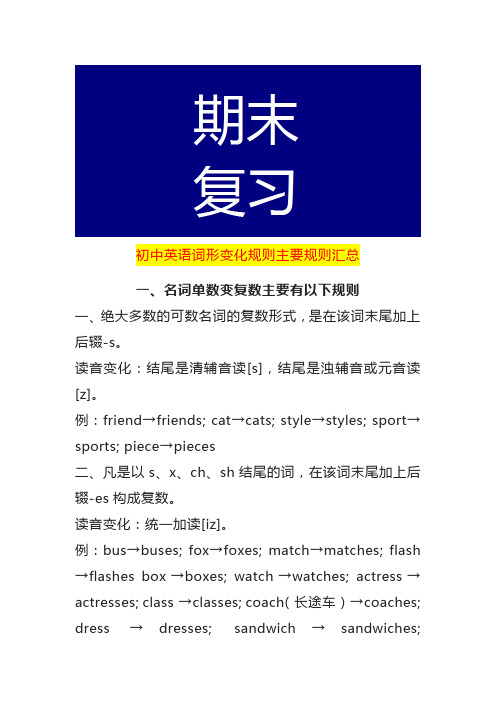
初中英语词形变化规则主要规则汇总一、名词单数变复数主要有以下规则一、绝大多数的可数名词的复数形式,是在该词末尾加上后辍-s。
读音变化:结尾是清辅音读[s],结尾是浊辅音或元音读[z]。
例:friend→friends; cat→cats; style→styles; sport→sports; piece→pieces二、凡是以s、x、ch、sh结尾的词,在该词末尾加上后辍-es构成复数。
读音变化:统一加读[iz]。
例:bus→buses; fox→foxes; match→matches; flash →flashes box →boxes; watch →watches; actress →actresses; class →classes; coach(长途车)→coaches; dress →dresses; sandwich→sandwiches;toothbrush →toothbrushes; waitress(女侍者)→waitresses三、以辅音字母 y结尾的名词,将y改变为i,再加-es。
读音变化:加读[z]。
例:candy→candies; daisy(雏菊)→daisies; fairy→fairies; lady→ladies; story→storiesstrawberry →strawberries; baby →babies; puppy →puppies; library →libraries; dictionary→dictionaries; cherry →cherries; activity →activities四、以-o结尾的名词,如果不是外来词或缩写,就加-es,否则加-s构成复数。
(有生命的加es,无生命的加s)读音变化:加读[z]。
例:tomato→tomatoes; potato→potatoes五、以-f或-fe结尾的名词,多为将-f或-fe改变为-ves,但有例外。
雅思阅读之词性变换解析
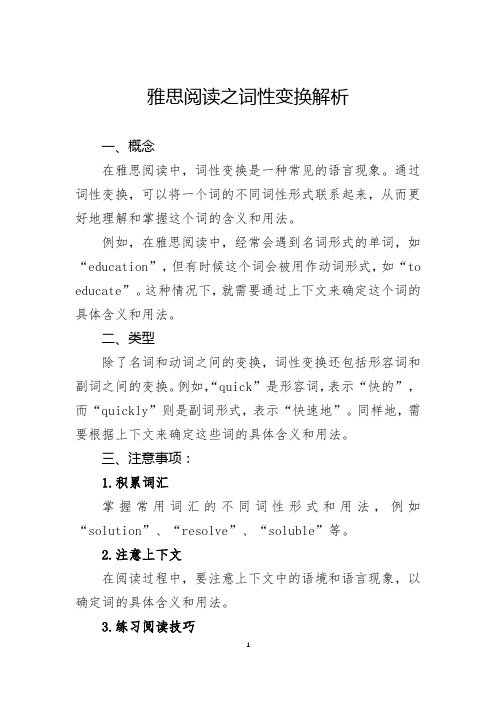
雅思阅读之词性变换解析
一、概念
在雅思阅读中,词性变换是一种常见的语言现象。
通过词性变换,可以将一个词的不同词性形式联系起来,从而更好地理解和掌握这个词的含义和用法。
例如,在雅思阅读中,经常会遇到名词形式的单词,如“education”,但有时候这个词会被用作动词形式,如“to educate”。
这种情况下,就需要通过上下文来确定这个词的具体含义和用法。
二、类型
除了名词和动词之间的变换,词性变换还包括形容词和副词之间的变换。
例如,“quick”是形容词,表示“快的”,而“quickly”则是副词形式,表示“快速地”。
同样地,需要根据上下文来确定这些词的具体含义和用法。
三、注意事项:
1.积累词汇
掌握常用词汇的不同词性形式和用法,例如“solution”、“resolve”、“soluble”等。
2.注意上下文
在阅读过程中,要注意上下文中的语境和语言现象,以确定词的具体含义和用法。
3.练习阅读技巧
通过练习阅读技巧,如略读、扫读、预测等,可以提高阅读速度和理解能力,从而更好地应对词性变换现象。
4.参考答案解析
在完成阅读理解题目后,可以参考答案解析来分析自己的错误原因,并重点理解和掌握文章中的重点词汇和短语。
总之,雅思阅读中的词性变换是一种常见的语言现象,需要考生在备考过程中注意积累词汇、练习阅读技巧并参考答案解析来提高自己的阅读能力和应试水平。
高中生必备---高考词形变化汇总 (超详细)

高中生必备---高考词形变化汇总(超详细)高考词形变化汇总是一份记录高中生必备的分类性词形变化表,它把常用单词和短语的变形进行总结,便于高中生们在学习、写作、口语等多方面应用。
高考词形变化汇总主要包括四大部分,即动词变化,名词变化,形容词变化和副词变化。
1. 动词变化动词变化主要包括三大部分,即不规则动词变化,实义动词变化,情态动词变化。
(1)不规则动词变化。
不规则动词变化是指某些动词的原形、过去式、过去分词和现在分词形式都不同,需要特别记忆的变化,如:原形过去式过去分词现在分词go went gone goingtake took taken takinggive gave given giving(2)实义动词变化。
实义动词变化是指一般动词,其原形、过去式、过去分词和现在分词可以用-ed,-d或-t 结尾来表示,如:原形过去式过去分词现在分词start started started startingneed needed needed needinghope hoped hoped hoping(3)情态动词变化。
情态动词变化是指用来表示能力、愿望、建议等语气的助动词,其变化规律比较简单,如:原形过去式过去分词现在分词must had to had to having tomay might might mightingwill would would willing2. 名词变化名词变化是指名词的变化,它包括复数变化和所有格变化,如:单数复数所有格book books book’sclass classes class’schild children child’s3. 形容词变化形容词变化主要包括比较级变化和最高级变化,如:原级比较级最高级happy happier happiestbeautiful more beautiful most beautiful difficult more difficult most difficult4. 副词变化副词变化主要包括比较级变化和最高级变化,如:原级比较级最高级quickly quicker quickestbadly worse worstcarefully more carefully most carefully 高考词形变化汇总是高中生学习的重要参考资料,其记忆变化规律,对于提高正确使用单词和短语的能力,有着重要的作用。
中考英语词性转换解题技巧及易错点讲解
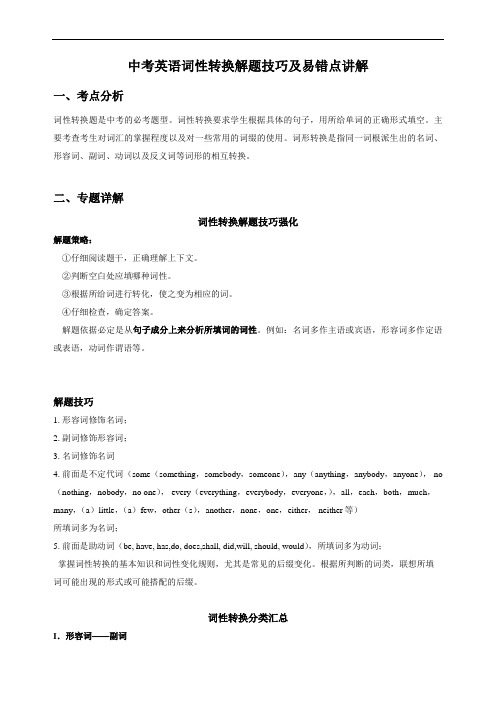
中考英语词性转换解题技巧及易错点讲解一、考点分析词性转换题是中考的必考题型。
词性转换要求学生根据具体的句子,用所给单词的正确形式填空。
主要考查考生对词汇的掌握程度以及对一些常用的词缀的使用。
词形转换是指同一词根派生出的名词、形容词、副词、动词以及反义词等词形的相互转换。
二、专题详解词性转换解题技巧强化解题策略:①仔细阅读题干,正确理解上下文。
②判断空白处应填哪种词性。
③根据所给词进行转化,使之变为相应的词。
④仔细检查,确定答案。
解题依据必定是从句子成分上来分析所填词的词性。
例如:名词多作主语或宾语,形容词多作定语或表语,动词作谓语等。
解题技巧1. 形容词修饰名词;2. 副词修饰形容词;3. 名词修饰名词4. 前面是不定代词(some(something,somebody,someone),any(anything,anybody,anyone), no (nothing,nobody,no one), every(everything,everybody,everyone,),all,each,both,much,many,(a)little,(a)few,other(s),another,none,one,either, neither等)所填词多为名词;5. 前面是助动词(be, have, has,do, does,shall, did,will, should, would),所填词多为动词;掌握词性转换的基本知识和词性变化规则,尤其是常见的后缀变化。
根据所判断的词类,联想所填词可能出现的形式或可能搭配的后缀。
词性转换分类汇总I.形容词——副词quiet安静的 quick 快速的 slow慢的 beautiful美丽的 bright明亮的 careful仔细的 certain一定clear清楚 loud大声 sad难过的 wide广泛 serious严重的 usual通常 final最后 safe安全real真的 recent最近的 main主要的 accurate精确的2、去y加ilyeasy容易的 heavy大量angry生气的 hungry饥饿的happy 快乐的 lucky幸运的3、le结尾的,去e变ypossible可能 gentle轻柔的4、不变hard难的;努力地,猛烈地 fast 快early早 late 晚enough足够 straight笔直II. 动词——名词1、加er、or、ress加erfarm 耕种—农民 drive 驾驶—驾驶员司机teach 教—老师 work 工作—工人 write 写—作家report 报道—记者 win 赢(winner)—获胜者 own 拥有—owner拥有者 paint画、粉刷---画家manage 经营—经理 record 记录—录音机加oract--actor 男演员 visit—visitor观光者 invent--inventor 发明家 calculate—calculator计算器加resswait—waitress女服务员 act—actress女演员2、加ion结尾add—add i tion 增加 collect—collection 收集 discuss—discussion讨论 decide—decision决定invent—invention发明物 invite—invitation 邀请 operate—operation手术 pollute—pollution 污染 review—revision 复习 solve—solution解答 organize—organization组织 locate—location地点suggest—suggestion建议 protect---prote ction 保护3、加ingbegin—begi nn ing开始 build—building大楼 say—saying 谚语 paint—painting 绘画meet—meeting 会议serve—service 服务 speak—speech 演讲、言语 fish—fisherman 渔夫 enter—entrance 入口know—knowledge 知识 weigh—weight 重量 please—pleasure 愉快 develop—development 发展 choose—choice选择 tour—tourist 游客die—death 死亡 succeed—success 成功fly—flight 飞行、航班 memorize—memory 记忆mix—mixture 混合物 cook—cook 厨师save—safety 安全 act—activity 活动 able—ability 能力III. 名词——名词art艺术—artist画家 science—scientist 科学家city—citizen市民 custom—customer 顾客office—officer 官员 engine—engineer工程师 friend—friendship 友谊business—businessman男商人 business—businesswoman女商人library—librarian 图书管理员 law法律—lawyer律师IV. 名词——形容词1、名词后加fulcare—careful 小心的 use—useful 有用的 help—helpful有帮助的 thank—thankful 感激的wonder—wonderful精彩的 power—powerful 强大的 harm—harmful 有害的2、名词后加ycloud—cloudy 多云的 rain—rainy 下雨的 wind—windy 有风的 snow—snowy 下雪的sun—su nn y 晴朗的 noise—noisy 吵闹的 health—healthy 健康的 fun—funny 滑稽的luck—lucky 幸运的3、名词后加lyfriend—friendly 友好的 love—lovely 可爱的 live—lively 活泼的4、形容词以al 结尾nation—national 国家的 education--educational 教育的 nature—natural 自然的tradition—traditional 传统的 medicine—medical 医药的 physics—physical 物理的chemistry—chemical 化学的 history—historical 历史的5、名词末尾的ce变成tdifference(s)—different 不同 importance—important 重要的6、名词后加enwood—wooden木制的 gold—golden金色的 (wool—woolen 羊毛的)7、名词以ness结尾kindness仁慈—kind仁慈的 illness病疾病--- ill有病的不健康的8、形容词后加ydifficult—difficulty 困难 honest—honesty诚实9、形容词后加domfree—freedom 自由 wise—wisdom 聪明10、其他danger—dangerous 危险的office—official 官方的、正式的fool傻瓜—foolish 愚蠢的west—western 西方的height高度— high高的 length长度—long 长的favour恩惠—favourite 最喜欢的 foreigner外国人—foreign 外国的 home家—homeless 无家可归的 expense费用—expensive 昂贵的 truth真相—true 真实的wound创伤—wounded 受伤的pleasure—pleasant 另人愉快的/ pleased 满意的response相应反映--- responsible 负责的有责任的electricity电—electric电的—electrical 与电有关的—electronic 电子的V. 动词——形容词interest引起兴趣—interesting 有趣的/ interested 感兴趣的excite—exciting 令人激动的/ excited激动的 freeze—freezing 寒冷的/ frozen 冷冻的frighten—frightening 令人害怕的/ frightened害怕的forget—forgetful健忘的 / unforgettable 难忘的 depend—independent 独立的有主见的like—likely很有可能发生的有希望的 realize意识到—real 真的break—broken 碎的 follow—following 下面的 fill—full 满的、饱的enjoy—enjoyable使人愉快的 change—changeable 多变的 act—active 积极的attract—attractive 吸引人的 die—dead 死的 widen拓宽—wide 宽的 live—alive活的VI. 前缀possible—impossible (polite, patient)可能—不可能 tell—retell说—复述build—rebuild 建造—重建healthy—unhealthy健康的—不健康的honest—dishonest诚实—不诚实的appear—disappear出现—消失like—dislike 喜欢—不喜欢male—female 男性—女性VII. 国名——国籍Australia—Australian America—American Canada—Canadian Britain—BritishEngland—English Italy—ItalianFrance— French Germany—German (德国人复数German s)强化练习从句子成分角度完成下列习题:1. Thanksgiving is a ______ festival in the USA and Canada. (tradition)2. There were only a few _____ from the air-crash. (survive)3. After careful ____, the committee decided to recommend Mr. Smith for the post. (consider)4. Do you agree that it is important to make yourself _____? (understand)5. I’ve lived in Chongqing for several years and I’m now used to _______hot food. (eat)6. He has to check the _____ of a difficult word before he uses it. (spell)7. The businessman lost a _______ chance to make a big fortune. (gold)9. In some parts of this city, missing a bus means ______ for another hour. (wait)10. Her early ______ gave everyone a big surprise. (arrive)11. The little girl gave an ______ wonderful performance last night. (extreme)12. The more challenging the journey is, the ______ the young people will feel. (happy)13. There has not been a favorable ______ to your plan so far. (respond)14. After they got on the bus, they found two _______. (sit)15. What we have had is just part of the truth. We should try to get ___________ information about it. (far)16. Now more and more gardens are being built in our __________. (neighbour)17. _________ speaking, the computer has become an important part of our life. (general)18. It will ______ rain this afternoon, for the sky is so dark now. (impossible)19. Many people in China are not familiar with ________ customs. (west)20.The room is so dirty that a lot of __________ can be seen running here and there. (mouse)21. It's rude to look ________ at a person. (straight)22. There is no short-cut to _________. ( succeed )23. The reporter went to the sea with several _________ to look for the lost boat. (fish)24. There are many places of ________ interest in Shanghai. (history)25. Mr. Marko is one of the __________ of that factory. (engine)26. It’s ten _________ walk from here. You needn’t take a bus. (minute)27. Jacky told us an ________ story that everybody laughed happily. (amusement)28. Thanks for _______ me. I’ll do my best. (choice)29. It’s much ___________ to swim with your friend than to swim alone. (safe)30. It was snowing _________ outside. (hard)31. How many ___________ lessons do you have every week? (physical)32. They were well ____________ at a friend’s house. (servi ce)33. The sun gives us light and ________. (hot)34. We saw her running _________ the street just now. (cross)35. I’ll do my homework more __________ next time. (care)36. In _________ to hard work, we need some good ways to succeed. (add)37. In the past punishment(惩罚)was decided by the university. The student had no ___________ but to accept it. (choose)38. A ___________ sight stopped them from going forward. (frighten)39. The visitors are ________ students. (main)40. Of all the boys, Li Ming studies ______. (hard)41. These modern machines work ____. (automatic)42. Actions speak _____ than words. (loud)43. I _________ where he comes from. (wonderful)44. We tried all sorts of __________, but they were all useless. (medical)45. Carl looks much ________ than before. (health)46. The little boy can run a marathon in __________ than three hours. (little)47. The lost calculator has been returned to its __________. (own)48. Even __________, he lost his job. (bad)49. Life today is becoming harder and busier, so everyone should have his own way of __________. (relax)50. I am fond of _________ fiction. (scientist)51. Could you tell me whether it is a ________ change or a physical change? ( chemistry )52. The students are not allowed to touch the ________ without permission. ( chemistry )53. Do you know who the telephone was________ by? (invention)54. We went to a beautiful lake and spent an _______________ day. (forget)55. What _____________ weather we are having now! (freeze)56. He tried to make more money to work out a solution to travelling _____________ (expensive)57. She _______ her face with her hands. (discover)58. Our house____________ an area of 200 square metres. (discover)59. The great_______ always teaches me how to _______ the ________ (paint)60. He is one of the most famous _________ in the university. (professional)答案:1-5 traditional;survivors;consideration;understood;eating6-10 spelling;golden;experienced;waiting;arrival;11-15 extremely;happier;response;seats;further16-20 neighborhood;Generally;possibly;western;mice21-25 straight;success;fishermen;historical;engineers;26-30 minutes';amusing;choosing;safer;hard31-35 physics;served;heat;across;carefully36-40 addition;choice;frightening;mainly;hardest41-45 automatically;louder;wonder;medicine;healthier46-50 less;owner;worse;relaxation;science51-55 chemical;invented;unforgettable;freezing55-60 expense;covered;covers;painter- paint-painting ;professor。
高考英语词形变化规则汇编背诵精华(推荐)

高考英语词形变化规则汇编背诵(名师总结语法知识点,值得下载每天背诵)一、名词1.1名词复数的规则变化情况构成方法读音例词一般情况加-s 清辅音后读/s/ map-maps浊辅音和元音后读/z/ bag-bags /car-cars以s, sh, ch, x等结尾加-es 读/iz/ bus-buses/ watch-watches例外:stomach---stomachs (ch发/k/)以ce, se, ze,等结尾加-s 读/iz/ license-licenses以辅音字母+y结尾变y 为i再加es 读/z/ baby---babies元音字母+y 结尾加–s 读/z/ holiday---holidays/boy--boys以y结尾的专有名词加–s 读/z/ Mary---Marys1.2 其它名词复数的规则变化1)以o 结尾的名词,变复数时:a. 一般加s,如:photo---photos piano---pianosb. 加es,如:tomato-tomatoes mangoes, Negro-Negroes hero-heroes歌诀记忆:黑人(Negro)英雄(hero)爱吃芒果、西红柿(tomato)和马铃薯(potato)。
除了这五个以-o结尾的名词加-es外,其余的以-o结尾的名词加-s。
c. 上述a和b两种方法均可,如zero---zeros / zeroes。
2)以f或fe 结尾的名词变复数时:a. 加s,如:belief---beliefs roof---roofssafe---safes gulf---gulfs;b. 去f, fe 加ves,如:half-halves knife-knives leaf-leaves life-lives wolf-wolvesthief-thieves self-selves wife-wives shelf-shelves歌诀记忆:树叶(leaf)半数(half)自己(self)黄;妻子(wife)拿刀(knife)去割粮;架(shelf)后窜出一匹狼(wolf);就像小偷(thief)逃命(life)亡。
考点20易错题型(一)词性转换-2023年中考英语一轮复习

考点20 易错题型(一)词性转换1.出题量最大,也是最难把握的方向——同词根不同词类之间的相互转换常考的相互转换词类有四种:名词、动词、形容词、副词名词→动词、形容词动词、形容词→名词动词→形容词形容词→动词形容词→副词副词→形容词做这样的转换需要平时大量的积累,建立词根词缀的概念,多掌握常用的词缀,灵活变通。
2.最基本题型,必考方向——名词、代词、数词名词考察方向:1. 复数代词考察方向:1. 宾格2. 形容词性、名词性物主代词转换3. 反身代词可能出现数词考察方向:1. 基数词、序数词的拼写与互换 2. 分数可能出现3.简单题型,多练即可把握——比较级最高级需要掌握:1. 比较级和最高级的变化方式 2. 比较级和最高级的辨识关键词4.较难题型,多次转换,反义理解有时候词类之间需要越级变换,要仔细斟酌词类间的修饰关系,确保答案的正确性。
较难题目不仅会越级变换,还需要添加反义,这需要更耐心细致地解题,分析题意。
考向一、解题技巧1.形容词修饰名词、代词性成分;部分名词也可以修饰名词。
2.动词、形容词、副词需要副词修饰,副词也可以修饰整句话。
3.系动词后一般使用形容词,连系动词后尤其需要注意添加形容词,这点易和实义动词用副词修饰混淆。
4.扎实掌握名词、代词、数词的基本知识。
5.注意做完需要通读一下,检查反义及动词的时态语态问题。
考向二、词性转换分类汇总1.动词转换为名词的常见方式1)“动词+ion”例如:pollute→ pollution, invent→ invention, discuss→ discussion, decide→ decision注意:review→ revision solve→ solution2)“动词去e+ ation”例如:invite→ invitation,organize→ organization3)“动词+er”例如: work→ worker, teach→ teacher, write→ write rspeak→ speaker, run→ runner, win→ winner4)“动词+ or"例如:invent→ inventor, act→ actor, visit→ visitor, calculate→ calculator5)“动词+ing"例如:build→ building, begin→ beginning, paint→ painting, mean→ meaning6)“动词十ment"例如:develop→ development, amuse→ amusement7)“动词十ress"例如:wait→ waitress, act→ actress8)“动词十ance"例如:appear→ appearance, perform →performance9)其他serve—service 服务speak—speech 演讲fish—fisherman 渔夫enter—entrance 入口know—knowledge 知识weigh—weight 重量please—pleasure 愉快choose—choice选择tour—tourist 游客die—death 死亡succeed—success 成功fly—flight 航班memorize—memory 记忆mix—mixture 混合物cook—cook/cooker 厨师/厨具save—safety 安全act—activity 活动able—ability 能力2.动词转换为形容词的常见方式1) “动词+ive"例如:act→ active, attract→ attractive2) “动词+ able"例如:change→ changeable, enjoy→ enjoyable3) “动词+ing"例如:excite→ exciting, follow→ following,freeze—freezing 寒冷的/ (frozen 冷冻的)4) “动词+ ed"例如:frighten→ frightened, bore→ bored5)“动词+ ful"例如:forget→ forgetful健忘的/ unforgettable/forgettable 难忘的/易忘的6) 其他:例如:depend→ independent,like→ likely,break→ broken,die→ dead,live→ alivePlease v.→ pleasure n.→ pleasant令人愉快的(指物)/ pleased 满意的(指人)w i d e n→w i d e e n r i c h→r i c h e n a b l e→a b l e3.名词转换为形容词的常见方式1)“名词+ ful"例如:care→ careful, use→ useful, power→ powerful2)”名词+ less"例如:care → careless, home→ homeless, help→ helpless3)“名词+ly"例如:friend→ friendly, love→ lovely4)“名词+y"例如:sun→ sunny, wind→ windy, health→ healthy, noise→ noisy, luck→ lucky, fun→ funny5)“名词+ing"例如:interest→ interesting6)“名词+n"例如:America→ American, Australia→ Australian7)“名词+ ern"例如:south→ southern, north→ northern8)“名词+ ous"例如:danger→ dangerous9)“名词+ en"例如:wood→ wooden, gold→ golden, wool→ woolen10)“名词+al"例如:nation→ national, education→ educational, medicine→ medical, nature→ naturalchemistry→chemical,history→historical,physics→physical,tradition→traditional11)其他例如:office→ official fool→ foolish foreigner→ foreign wound→ woundedelectricity电→electric电的→electrical与电有关的→electronic 电子的4.形容词转换为名词的常见方式1)“形容词+y"例如:difficult→ difficulty, honest→ honesty2)“形容词词尾t改成ce"例如:different→ difference, important→ importance3)“形容词+ ness"例如:ill→ illness, kind→ kindness, sad→ sadness, happy→ happiness4)“形容词+ dom"例如:free→ freedom, wise→ wisdom5)其他例如:high→ height long→ length true→ truth responsible→ responsibility5.形容词转换为副词的常见方式1)“形容词+ly“例如:quiet→ quiet careful→ carefully main→ mainly2)“形容词去y加ily“例如:easy→ easily heavy→ heavily lucky→ luckily3)“形容词le结尾的,去e变y“例如:possible→ possibly gentle→ gently terrible→ terrible4)“形容词e结尾的,去e变ly“例如:true→ truly(只有true特殊) nice→ nicely5)“形容词不变“例如:early早late 晚hard难的;努力地fast 快wide(宽的)/widely(广泛的)6.名词转换为名词的常见方式例如:art→ artist science→ scientist piano→ pianistcity→ citizen custom→ customer engine→ engineerfriend→ friendship business→ businessman law→ lawyerlibrary→ librarian music→ musician office→ officer(职员)/official(官员)7.词性转换中前缀的使用例如:possible→ im possible (polite, patient)tell→ re tell (build, write, use)healthy→ un healthy(happy, lucky, usual)honest→ dis honest (advantage)regular→ ir regular rich→ en rich (able)c o n v e n i e n t→i n c o n v e n i e n t(e x p e r i e n c e d/c o r r e c t/d i re c t/e x p e n s i v e/p l e t e)8.国名——国籍例如:Australia—Australian America—American Canada—CanadianBritain—British England—English Italy—ItalianFrance— French Germany—German (德国人复数German s)C h i n a—C h i n e s e J a p a n—J a p a n e s e K o r e a—K o r e a n1.The actor and the actress left ________ after the performance yesterday. (direct)2.Without hard work, no one can expect to ________ in doing anything great. (success)3.To be a good teacher, being patient is a ________ requirement. (base)4.About one billion people speak English as a native or ________ language. (two)5.A wide ________ of activities in the camp will attract more students this ing holidays. (various)6.There is enough ________ for people to keep valuable things in the bank. (safe)7.Jenny’s interest in drawing ________ es from her art teacher. (main)8.A good detective never makes his ________ before he has got enough proofs. (decide)9.A serious car accident ________ (happen) in this street last Sunday.10.I _________(sudden)remembered that I didn’t bring my key.11.Neither his parents nor he _________(like)lemon juice.12.The movie made _________(they)feel energetic.13.Let’s drink to the _________(friend)between us.14.Let’s see how ________ we can keep all these new words in our minds. (length)15.The boy felt ________ (disappoint) because his parents forgot his birthday.16.He’s ________ (luck) to get a chance to study abroad.17.Everyone in our school is ________ for making the school campus clean and pretty. (responsibility) 18.Download that app., and we can find a ________ of language courses open to us. (various)19.He finally ________(overe)his fear of flying and took his first flight.20.Miss Lee is the most patient and ________ (care) teacher that I have ever known.21.John was asked to give a speech in the ________(graduate)ceremony.22.A good teacher can encourage the students’ ________ (creative).23.The cartoon brings joy and ________(happy)to many children.24.Amy is a(n) ________ (usual) woman from America. She is a famous artist now.25.Poets and artists often draw their ________ (inspire) from nature.26.New ________(method)of teaching foreign languages are used in this school. 27.Hi, everyone, let’s wor k hard! The future is ________ (we).28.The students will run to the dining hall as soon as the lunch bell ________ (ring). 29.I remembered ________ (see) the movie, but I forgot its name.30.Miss Lee is an extremely ________ (care) teacher. She cares about every student.31.The old man thought to ________(he), “How lucky I am!”32.A ________ (bank) is a person who owns a bank or has an important job in a bank. 33.In hot summer days, many children feel like ________ (drink) cold water.34.The nurse was ________ (examine) her patient when the telephone rang.35.She went to Hollywood to look for ________ (famous) and wealth.36.Lily made her little brother stop ________(cry).37.He can’t make himself ________ (understand) because of his poor English.38.I think the story is _______ (believe). It may be true.39.It’s too _______ (expect). I don’t dare to believe the result.40.—I don’t like making speeches in public. It’s so _______ (embarrass).—I agree with you.41.The _______(discover)of power plays an important role in society.42.The story in the game is not ________ (believe). You don’t have to take it seriously. 43.A good beginning makes a good ________ (end).44.Few people realized the ________ (discover) was important.45.He made others feel ________ (embarrassing) by playing tricks on them.46.There are no more fish for ________ (fisherman) to catch in the river.47.We should stop using the ________ (wood)chopsticks to protect the forest. 48.All of the students should take part in ________ (keep) our school clean and tidy. 49.The wounded fish is swimming in the river. It is still ________(live).50.It was late. Ann got ________ (dress) quickly and ran to the bus stop without breakfast.51.The red wine made her feel ________ (sleep). She has gone to bed.52.Have you heard from your pen pal from the US ________(late)?53.My father and Uncle Wang have been good friends for many years, and their ________ (friend) is very strong. 54.Be ________ (thank) and happy for the gifts you received.55.We should make sure our kids have the ________ (able) to make their own decisions.56.My parents will attend my ________ (graduate) ceremony tomorrow.57.Attention, please. I have an important ________ (announce) to make.58.The young man is ________ (believe). He never tells a lie.59.She ________ (overe) all kinds of difficulties and won the Olympic gold medal.60.Their teaching methods are much better than ________ (our).61.The UK is an old ________ (Europe) country, where there are many palaces and castles.62.I don’t like loud music. It often makes me feel ________ (fortable).63.The old man has a lot of wealth, but he is always worried about ________ (lose) his money.64.I feel like ______(dance)when I listen to the music.65.I always feel nervous before the final ______(examine).66.We will insist on it until she ________ (change) her idea.67.Betty ________ (watch) television on every Friday evening.68.You’d better not go because it’s raining ________ (heavy) outside.69.We think Samuel is the most suitable person to be our monitor because he does everything very ________ (careful).70.Luckily, some people managed to run out of the ______(burn)building.71.The leader’s ______ (expected) arrival threw us into total confusion.72.In some ______ (west) countries, people go to church on weekends.73.The passengers felt lucky to be ______ (live) after the accident.74.Never forget to be ________ (thank) to the people who have helped you.75.Parents should be ________ (responsibility) for their children’s studies.76.I think a ________ (wood) chair is more fortable than a metal one.77.Don’t give up ________ (try) and you will make it in the end.78.Our team ________ (win) the school petition last week.79.The book is so interesting that I can’t stop ________ (read) it in class.80.Peter’s jacket looked just the same as Jack’s, but it cost ________ (two) as much as Jack’s.参考答案:1.directly【详解】句意:昨天表演结束后男女演员就直接离开了。
英语词形变换的考点解析

英语词形变换的考点解析一、题型分析词形变换是中考英语中一个常用题型,它所涉及到的形式主要包括:名词的单复数及所有格,代词的主格和宾格以及相应的物主代词形式,数词的适当形式(基数词和序数词),动词的正确形式(单数第三人称、过去式、过去分词、现在分词),非谓语动词(尤其是不定式和动名词);形容词和副词的比较级;等等。
二、命题形式词形变换题一般有三种出题形式:第一种是根据所给要求变换词形;第二种是根据句意用括号内所给词的适当形式填空(这是全国各地采用最多的命题形式);第三种是在括号内给出汉语,要求考生根据句子意思及所给汉语提示,写出空缺处各单词的正确形式。
第一种题型,即根据括号内的要求变换词形,比较简单,要做好它主要靠平时多积累。
第二、三种题型则较复杂,它不仅涉及词语的正确形式,而且还涉及句意和语法等多个方面。
三、答题方法要做好该类题应注意以下三点:一是要通读全句,弄清句意;二是要弄清所给单词的词义、词性以及具体要求;三是要考虑到所填词在特定语境中的用法以及相关句子结构对它的限制。
四、实战演练用所给词的适当形式填空。
1. The _______ are going to move to Paris. (Smith)2. Don’t make any noise. The ______ are sleeping. (baby)3. How much are the _______, please? (tomato)4. I saw a lot of ______ on the hill. (sheep)5. He says that ______ like to watch TV. (child)6. I want to put some ______ in the book. (photo)7. There are more ______ doctors in this hospital than before. (woman)8. She is too young to look after ______. (she)9. Help ______ to some fish, boys and girls. (you)10. Have you finished _______ the book? (read)11. You shouldn’t keep _______ about it.(think)12. The _______lesson is the most interesting. (nine)13. This room is the _______ in this hotel. (good)14. Mother went on _____ her letter for two hours. (write)15. We can hear the girl ______ in her room now. (sing)16. Thank you very much for _____ me to your party. (ask)17. Don’t forget _____ us as soon as you get there. (ring)18. They spent two hours ______ the house yesterday. (clean)19. When she came in, she saw a purse ______ on the floor. (lie)20. Can you answer my questions without ______ at your books? (look)21. Hainan is the second _____ island in China. (large)22. Which is _____ (far) from us, the sun or the moon?23. Mike is ill. His mother feels _____ (worry)24. Our new teacher is very _____ to us. (friend)25. I remember that it was raining ______ that night. (heavy)【参考答案】1. Smiths2. babies3. tomatoes4. sheep5. children6. photos7. women8. herself9. yourselves 10. reading 11. thinking 12. ninth 13. best 14. writing 15. singing 16. asking 17. to ring 18. cleaning 19. lying 20. looking 21. largest 22. farther 23. worried 24. friendly 25. heavily。
历年高考常考词性转换全汇总,赶快练起来!
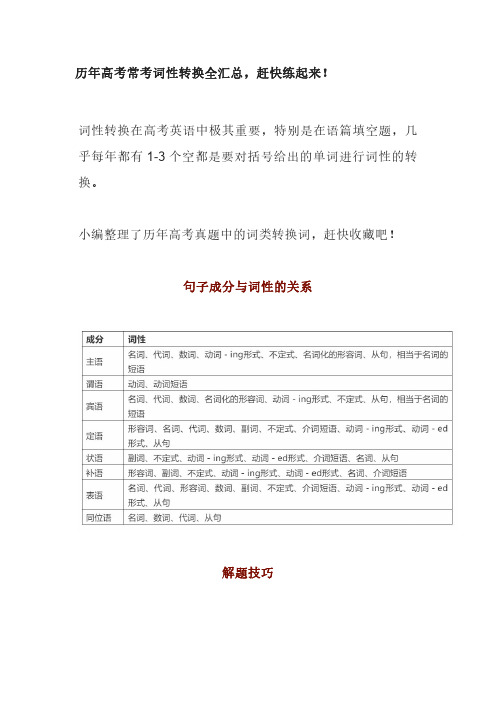
历年高考常考词性转换全汇总,赶快练起来!词性转换在高考英语中极其重要,特别是在语篇填空题,几乎每年都有1-3个空都是要对括号给出的单词进行词性的转换。
小编整理了历年高考真题中的词类转换词,赶快收藏吧!句子成分与词性的关系解题技巧①若提示词在主语或宾语的位置,且前面有冠词、形容词、物主代词等,一般填名词形式。
②若提示词作表语,或修饰后面的名词,一般填形容词形式。
③若提示词对整个句子或对其前、后的动词、形容词起修饰作用,一般填副词形式④要牢记常见的后缀形式,确保正确转换词性。
活用构词法,秒杀词性转换牢记几种常考的构词法1.形容词变副词的后缀2.形容词变名词的后缀3.动词变名词的后缀常见的动词变名词的后缀有-al,-ance,-ence,-ion,-tion,-ation,-(ss)ion,-ing,-ment,-ure,-ture,-y等。
4.动词、名词变形容词的后缀常见的动词、名词变形容词的后缀有-able,-al,-ful,-ed,-ing,-ible,-ive,-ous,-some,-y,-ern,-ish等。
5.表示否定或相反意义的前缀和后缀常见的表示否定或相反意义的前缀和后缀有dis-,il-,im -,in-,ir-,mis-,un-,-less等。
6.变动词的前缀和后缀近年高考英语5大类词形转换全汇1形容词→副词形容词变副词的一般情况1.(2019·全国Ⅱ卷)final最终的→finally终于2.(2018·全国Ⅱ卷、2014·全国Ⅰ卷)actual真实的→actually 实际上3.(2016·全国Ⅰ卷)official正式的→officially正式地4.(2016·全国Ⅲ卷)gradual逐渐的→gradually逐渐地tips:关于形容词词尾l,同学们怕是有很多误会,要知道变副词时:"ll"结尾加-y,如full→fully,dull→dully;"le"结尾e改y,高中阶段只有whole→wholly是例外。
【中考英语核心词汇】词形变换专题指导

一. 转化:指由一种词性转化为另一种词性的构词形式。
1.名词转化为动词:book (n 书— v 预定);seat (n 座位— v 使就位;落座);water (n 水— v 浇水)2.动词转化为名词:try (v 尝试— n 尝试);look (v 看— n 表情);dream (v 做梦— n 梦)3.形容词转化为动词:dirty (adj 脏的— v 弄脏);slow (adj 慢的— v 放慢;减慢);right (adj 正确的— v 纠正);dry (adj 干的— v 变干);free (adj 自由的— v 解放;使自由);4.形容词转化为名词:dear (adj 昂贵的— n 喜欢的人/ 物);quiet (adj 寂静的— n 寂静)5.其它词类的转化情况:Our classroom faces south. (south:n 南方;南面— adv 向南;朝南)6.当英语词汇转化时,转化后的词的读音常有变化。
二. 合成:指由两个或两个以上本身有独立含义的词合在一起组成一个有具体意义的新词的构词形式。
1.合成形容词的常见构词形式:⑴数词+ 名词a five - year plan (五年计划);first-class products (一级品);second-hand goods (二手货)⑵数词+ 名词+eda three - legged bench (三条腿的登子);a one - eyed camel (一只眼的骆驼)⑶数词+ 名词+ 形容词a 20-year-old lady (一位20 岁的女士);a 1,000-metre-long bridge (一座1000 米长的桥)⑷名词+ 现在分词peace-loving (热爱和平的);meat-eating (食肉的);history-making (创造历史的)⑸名词+ 过去分词heart-broken (伤心的);man-made (人造的);water-covered (被水覆盖的)⑹形容词+ 名词+edabsent-minded (漫不经心的);blue-eyed (蓝眼睛的);kind-hearted (和善的)⑺形容词+ 现在分词bad-looking (相貌丑陋的);fine-sounding (动听的);easy-going (容易相处的)⑻形容词+ 名词short-term (短期的);part-time (兼职的);high-class (高级的);large-scale (大规模的)⑼副词+ 现在分词hard-working (努力工作的);far-reaching (深远的);ever-lasting (永恒的)⑽副词+ 过去分词well-developed (高度发达的);well-known (著名的);well-trained (训练有素的)⑾其他构词形式的合成形容词all-round (全面的);face-to-face (面对面的);thank-you (感谢的);out-of-date (过时的)2.合成名词的常见构成形式:①名词+ 名词silkworm (蚕);footprint (脚印);newspaper (报纸);glasshouse (温室);bedroom (卧室)②名词+ 动名词handwriting (书法);sun-bathing (日光浴);sight-seeing (观光)③形容词+ 名词shorthand (速记);hotline (热线);blackboard (黑板)④动名词+ 名词waiting-room (候车室);sleeping-pill (安眠药);writing-desk (写字台);reading-room (阅览室)⑤动词+ 名词pickpocket (扒手);post office (邮局);playground (操场);break-water (防波堤)⑥动词+ 副词get-together (联欢会);break-through (突破);take-off (起飞);lookout (岗哨)⑦副词+ 动词downfall (垮台);overthrow (推翻);outbreak (爆发);income (收入;所得)⑧其他构成形式的合成名词well-being (福利);good-for-nothing (无用之人);by-product (副产品);touch-me-not (含羞草);self-improvement (自我完善);self-criticism (自我批评)注意:合成词如果出现复数形式时通常在其后加-s 或-es ,如by-products,reading-rooms,但应特别注意:passers-by,lookers-on 等词语是在其表达该词中心含义的词上加-s 或-es .3.合成动词及其他合成词类:overthrow (推翻);sleep-walk (梦游);undergo (经历);everything (一切);furthermore (而且);forever (永远);maybe (也许)三. 派生:指由一个词根加上前缀和(或)后缀构成另一个词的构词形式。
高考必备的词形变化规则及练习(形容词副词和动词的

高考必备词形变化规则和练习〔形容词副词和动词〕注:本表整理收藏了高考要求的形容词副词和动词的规则和不规则的变化,其所附的练习中的词汇全部为全国考纲要求的高考词汇。
考生在高考前应熟悉这些词型变化。
一、形容词和副词的比较级和最高级1. 比较级和最高级的构成:1〕单音节形容词与少数以er, ow结尾的形容词和副词,在后面直接加er,est。
例如:great – greater- greatest fast- faster- fastestclever- cleverer- cleverest narrow- narrower- narrowest2) 以e结尾的单音节形容词副词后与少数以ble ,ple 结尾的双音节形容词副词后只加r ,st。
例如:large- larger- largest able- abler- ablest simple- simpler- simplest3) 重读闭音节,末尾只有一个辅音字母时,要双写最后一个辅音字母再加er,est:hot- hotter- hottest fat – fatter- fattest thin- thinner- thinnestred- redder- reddest big- bigger- biggest4) 以辅音字母加y 结尾的词,改y 为i ,再加er,est:easy- easier- easiest early- earlier- earliest5) 一般的双音节和多音节形容词和副词,在原级前家more、most构成比较级和最高级:beautiful- more beautiful- most beautiful carefully- more carefully- most carefully少数单音节词,如real, tired, glad, fond, pleased 等也这样变:tired- more tired- most tired pleased- more pleased- most pleased6)下列形容词与副词strict, friendly 等的比较级和最高级有两种:cruel- crueler- cruelest cruel- more cruel – most crueloften- oftener- oftenest often- more often- most often7〕有些形容词副词的比较等级不规则:good - better- best well- better- best bad- worse- worstill- worse- worst badly- worse- worst many- more- mostmuch- more- most little- less- least far- farther- farthestfar- further- furthest old- older- oldest old- elder- eldest二、动词不同形式的变化规则1.动词变第三人称单数形式,其规则与名词复数的变化相同:1) 大部分动词是在其后加s:absorb- absorbs, accept- accepts adapt- adapts aim- aimsabuse- abuses accelerate- accelerates accumulate- accumulates2) 以s, x, ch, sh 结尾的词,在其后加es:access- accesses accomplish- accomplishes attach- attaches3)以辅音字母加y 结尾的,改y为i,加es:accompany- accompanies apply- applies clarify- clarifies2. 动词ing形式1) 大部分动词是在其后加ing:work- working apply- applying consist- consisting attach- attaching2) 以不发音的e 结尾的动词,去掉哑巴e ,加ing:advocate- advocating write- writing argue- arguing decline- declining3) 重读闭音节且末尾只有一个辅音字母的,双写最后一个辅音字母再加ing:beg- begging begin- beginning, commit- committing cut- cuttingdrop- droppingdig- digging equip- equipping fit- fittingforbid- forbidding get- gettinghit- hitting hug- hugging jog- joggingpin- pinning plot- plotting quit- quitting rob- robbing rot- rottingrun- running split- splitting spit- spitting stop- stopping swap- swapping trap- trapping win- winning3.动词的过去式和过去分词变化规则1〕普通的动词,直接加ed:consult - consulted cross- crossed succeed- succeeded2〕以不发音的e 结尾的动词,去掉哑巴e ,直接加d:imagine- imagined cycle- cycled compete- competed distribute-4)3) 以辅音字母加y 结尾的,改y为i,加ed:study- studied rely- relied accompany- accompanied apply- applied clarify- clarified terrify- terrified tidy- tidied4)重读闭音节且末尾只有一个辅音字母的,双写最后一个辅音字母再加ed: beg- begged- beggedcommit- committed - committeddrop- dropped - dropped equip- equipped - equippedfit- fitted- fitted hug- hugged- huggedjog- jogged- jogged pin- pinned- pinnedplot- plotted- plotted quit- quitted- quittedrob- robbed- robbed rot- rotted- rottedstop- stopped- stopped swap- swapped- swappedtrap- trapped- trapped5)大部分常见动词为不规则动词,需要专门记住。
- 1、下载文档前请自行甄别文档内容的完整性,平台不提供额外的编辑、内容补充、找答案等附加服务。
- 2、"仅部分预览"的文档,不可在线预览部分如存在完整性等问题,可反馈申请退款(可完整预览的文档不适用该条件!)。
- 3、如文档侵犯您的权益,请联系客服反馈,我们会尽快为您处理(人工客服工作时间:9:00-18:30)。
词形变换类题型的几个考点一、可数名词单数变复数类:1.规则变化:(1)一般情况加-s, 如: girls, books, pens, bags, boys, days等。
(2)以s, x, ch, sh结尾加-es, 如: buses, boxes, watches, brushes等。
(3)以o结尾的名词,无生命的名词多加-s,有生命的名词多加-es。
(4)以辅音字母加y结尾的名词, 变y为i加-es, 如: city→ cities(5)以f或fe结尾的名词变f或fe为v加-es。
如: leaf→leaves, knife→knives, shelf →shelves wife→ wives等。
2.不规则变化的名词要熟记:man→men, woman→women,child→children,foot→feet,tooth→teeth,mouse→mice, people→people, sheep→ sheep, Chinese→Chinese, Japanese→Japanese, deer→deer 二、动词/名词变形容词类:1.在动词后加后缀-ful, 如:care→careful; use→useful; thank→thankful; help→helpful;wonder→wonderful forget→forgetful2.在名词后加-y, 如:luck→lucky, cloud→cloudy; wind→windy; rain→rainy; sun→sunny, snow→snowy noise-noisy health→healthy3.在名词后加-ly, 如:friend→friendly love→lovely day→daily4.方位名词加-ern,如:east→eastern west→western south→southern north→northern三、形容词加后缀变成名词1.形容词加-ty变成名词,如:safe→safety difficult→difficulty2.形容词加-th变成名词,如:true→truth warm→warmth young→youth四、形容词变副词类:形容词修饰名词、代词等作定语或表语;副词修饰动词、形容词或副词作状语。
1.一般形容词词尾加-ly变成副词,如:slow→slowly clear→clearly quick→quickly quiet→quietlycareful→carefully sudden→suddenly real→really polite→politelysafe→safely wide→widely2.以“辅音字母+y”结尾的,要变y为i加-ly,如:easy→easily,happy→happily,heavy→heavily,lucky→luckily,busy→busily angry→angrily;3.以元音字母+e结尾,去e加-ly,如:true→truly4.以辅音字母加-le结尾,去e加-y,如:terrible→terribly possible→possibly5.形容词与副词同形,如:fast→fast early→early high→highhard→hard6.注意:hard作形容词时意思是“困难的;硬的;生硬的”等;作副词时意思是“努力地”。
hardly是否定副词,意思是“几乎不”。
五、动词变名词类:1.动词加-er变成名词,如:work→worker farm→farmer teach→teachersing→singer speak→speaker play→playerread→reader drive→driver write→writerride→rider dance→dancer run→runner;win→winner cook→cooker travel→traveler2.动词加-or 变成名词,如:visit→visitor invent→inventor conduct指挥v.→conductor act → actor 六、基数词变序数词类:主要掌握好1---12和20、30、40、50、60、70、80、90及21、22、23这几个序数词的形式:one→first twenty→twent ieth two→ secondthirty →thirt ieth three→third forty →fort iethfour→ fourth fifty →fift ieth five → fifthsixty →sixt ieth six→ sixth seventy →sevent iethseven→ seventh eighty →eight ieth eight→ eight hninety →ninet ieth nine→nin th ten→ tentheleven→ eleventh twelve→twel fth twenty-one →twenty-first twenty-two →twenty-second twenty-three →twenty-third七、形容词与副词的原级、比较级和最高级类1.形容词和副词的比较级、最高级构成部分双音节词或以形容词加-ly变成的副词和多音节词,在其前加more, most 变成比较级和最高级。
如:interesting → more interesting,→ most interestingbeautiful → more beautiful,→ most beautifulslowly → more slowly,→ most slowlyquickly → more quickly,→ most quickly不规则变化:good→better→best well→better→bestmany→more→most much→more→mostlittle→less→leastfar→farther/further → farthest/furthestill → worse → worstbad/badly → worse → worstold → older/elder → oldest/eldest2.原级: as+adj./adv.+ as …(肯定)“和……一样……”,not as / so+adj./adv.+as …(否定)“和……不一样……”“……不如……”●Chongqing is as beautiful as Shanghai.●Tina studies math as well as her sister in our school.●Tom didn’t sleep so early as me●Why don’t you finish your homework so carefully as you used to?●My mother isn’t so old as my father.八、人称代词变化类:要熟练掌握和运用主格、宾格、形容词性物主代词及名词性物主代词。
九、常见的反义词:1.动词buy — sell take — bringremember — forget die — livelove — hate rise — fallask — answer start — finishmiss — catch pull — pushgo — come end — borrow2.形容词little — much short — tall / longright — left / wrongfree — busy full — emptyfew — many good — badwhite — black careful—carelessdead — living cheap — expensive clean — dirty easy —difficultwet — dry same — differentopen — closed strong —weaklight — heavy注:词型变化不加to,are,can(may,must等情态动词)习题精选1. The mother didn’t know why her daughter was crying . (noise)2. He was one of the best in yesterday’s football match. (p lay)3. Guangzhou is in the part of China. (south)4. September 10th is Day. (teacher)5. Beijingers are true to the world. (friend)6. Look! How Kate is laughing! (happy)7. It’s only ten walk from the station to the hotel. (minute)8. Please take care of , boys and girls. (you)9. I don’t think this is my pen, though it looks like . (I)10. Mrs. Read learned Chinese as her _________ language. (two)11. Do you think July is than any other month in our country? (hot)12. Of all the students in our class, Lucy talks but does most. (little)13. Here are ten of the names. (run)14. It snowed last night and now the streets are covered with snow. (heavy)15. You shouldn’t ride your bike so fast at the . (turn)16. Help to these cakes, children. (you)17. Please keep your eyes . (close)18. John is the student in our class. (old)19. Mike will have his birthday party at home tomorrow. (twelve)20. How many are there in your class? (girl)21. This sweater is Lucy’s and that one over there is . (my)22. Now people use computers very . (wide)23. What would you like, some or vegetables? (meat)24. the help of our teacher, we couldn’t pass the exam. (with)25. We can not decide who should open the present . (one)26. We always go to the library a week. (one)27. The house next to the street are very . (noise)28. More and more have come to visit China these years. (foreign)29. In a few time, those mountains will be covered with trees. (year)30. Everyone knows that if Dick works , he will do much better. (hard)31. Those flowers are beautiful. (real)32. Uncle Wang is one of the most popular in this factory. (work)33. She worked so that nobody knew she was there. (quiet)34. Meimei is one of the best ___________ in her class. (student)35. We can find many _____________in the picture. (sheep)36. He sat down and warmed his ______________ at the fire. (foot)37. _____________ fall in autumn. (leaf)38. Our building is eighty _________________ high. (foot)39. Do you usually come to school on _______________?(foot)40. March 8 is _________________ Day. (woman)41. The sick woman is getting . (ill)42. Are you in sports? (interest)43. Teachers should speak to their students in a way. (friend)44. You can do the work by yourself, can you? (hard)45. Today is a day. (cloud)46. We are very to the teacher for his help. (thank)47. The house caught a fire. The wounded man was carried to . (safe)48. The boy was not born in . (German)49. Edison was a great . During his life he had many .(invent)50. I was ill yesterday. (bad)答案:1. noisily2. players3. southern4. Teachers’5. friends6. happily7. minutes’8. yourselves9. mine 10. second11. hotter 12. least 13. runners’ 14. heavily 15. turning16. yourselves 17. closed 18. oldest 19. twelfth 20. girls21. mine 22. widely 23. meat 24. Without 25. first26. once 27. noisy 28. foreigners 29. years’ 30. harder31. really 32. workers 33. quietly 34. students 35. sheep36. feet 37. Leaves 38. feet 39. foot 40. Women’s41. worse 42. interested 43. friendly 44. hardly 45. cloudy46. thankful 47. safety 48. German, Germany49. inventor, invention 50. badly。
